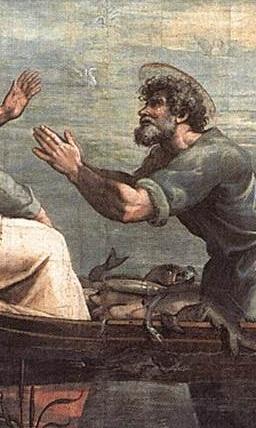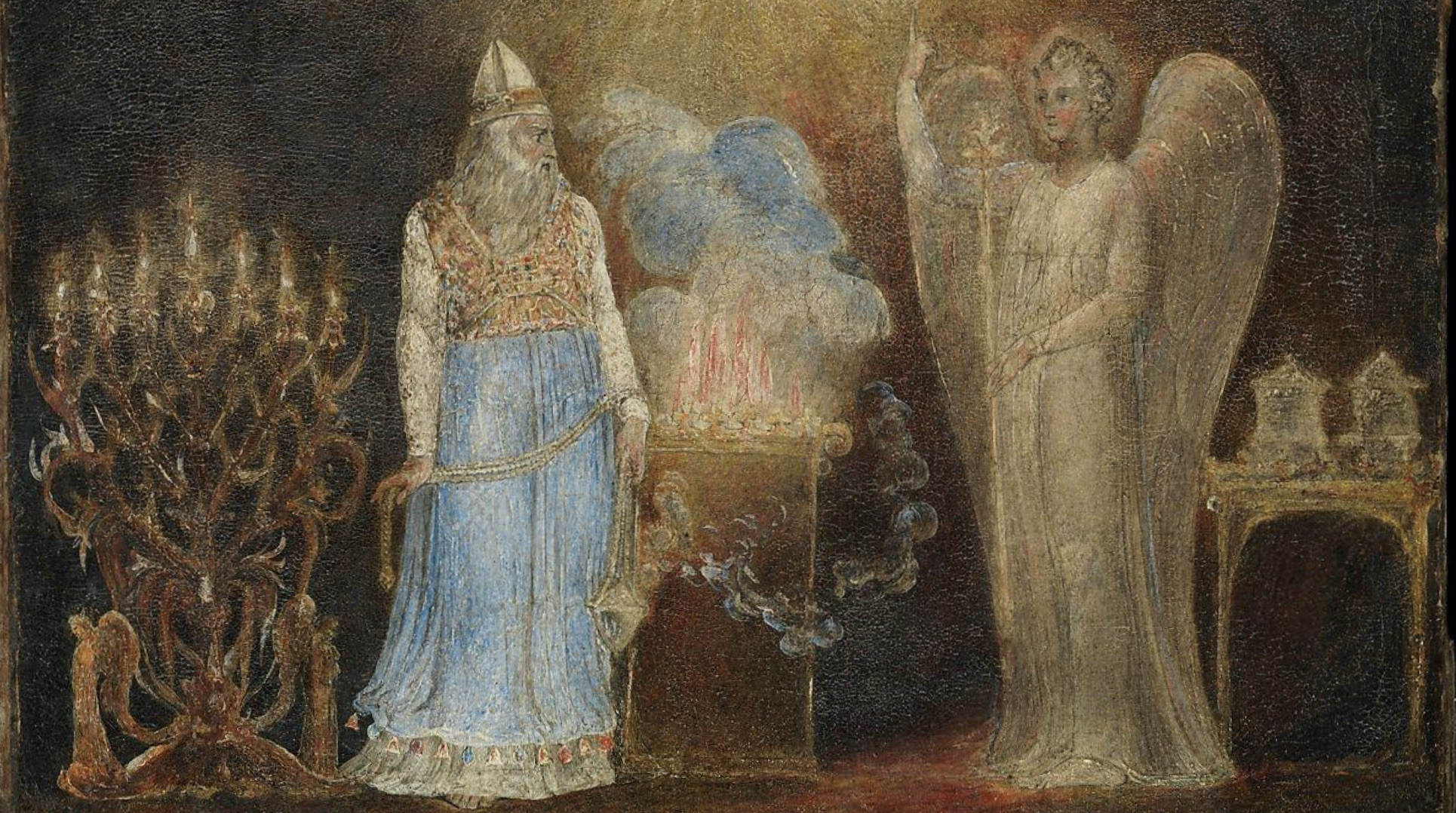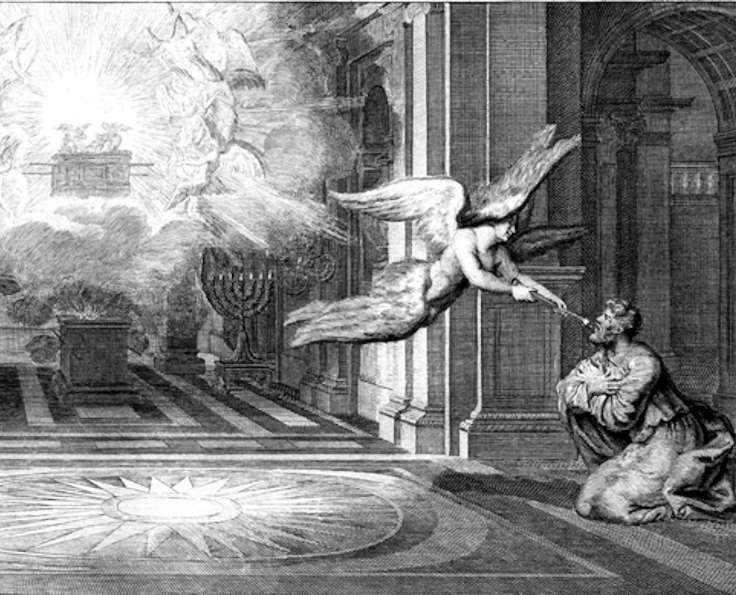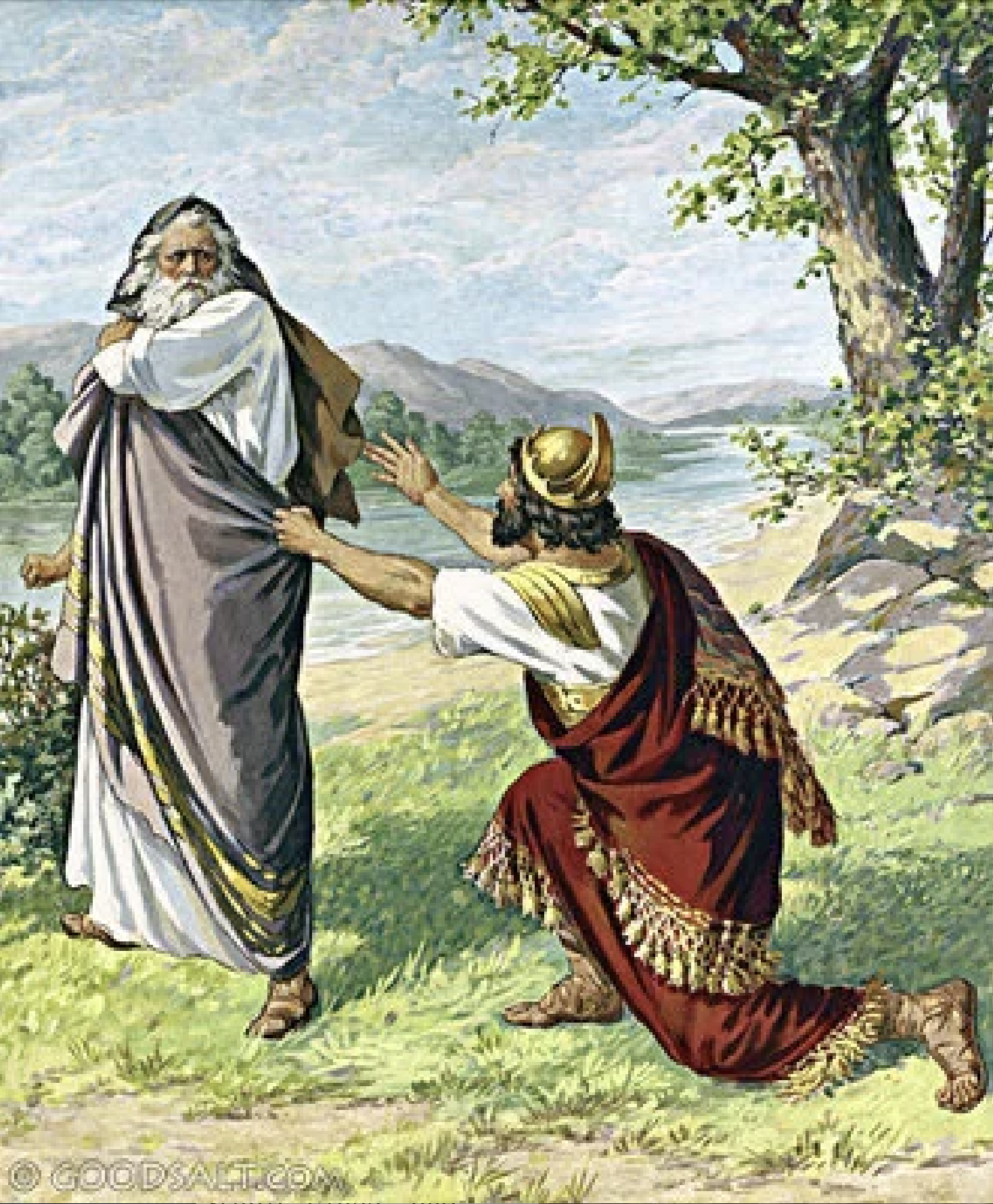
We are left with one conclusion that Heaven is here .... and everywhere. The Psalmist writes,

Imagine that you hear a knock at the door. You answer it and encounter two Secret Service agents presenting their credentials. They inform you that you have been summoned to the White House to receive the Medal of Freedom, and they begin your security background process. Standing there in your doorway, you already feel under-dressed and under-groomed and certainly not prepared for this.
But that is nothing compared to Zechariah's experience (as we contemplated this past Monday observing the Conception of St. John the Forerunner). For standing at the right hand of the Altar of Incense is the Archangel Gabriel, a Son of God. In this case, Zechariah is dressed and groomed for the occasion, following the course of the priestly rota. But he is not ready. He is not prepared. And we do well to pause and remember that being prepared is the whole reason for this Divine appointment: to announce the one who will
| " .... make ready a people prepared for the Lord" (Lu 1:17). |
We learn here that in the Halls of Heaven our readiness is of utmost importance. In fact, isn't this a theme among all God's messengers: that we be mindful, hence ready, for the Divine.
In this, we take steps in understanding the human urge to distance Heaven far above us, far away from us. C. S. Lewis styles God as being "the Emperor Over-sea." A long voyage eastward is required to get there and, no doubt, due time at anchorage to groom and dress for the great moment of preparing ourselves, presenting ourselves before Him.
This has been the longtime custom of the Christian imagination: that God is distant. Yes, we must face Him at the end of our lives, but that too is distant .... we love to tell ourselves. But when distant death is suddenly replaced by instant death, then these most important calculations are all thrown to the four winds.
Because of the Dominican monk Thomas Aquinas and his love of elaborate hierarchies, which he imposed upon Hell, upon earth, and upon Heaven, we in the West have conceived of a two-tiered structure: up is Heaven, Whose streets are paved with gold according to the old Spiritual, and down is gritty earth.
During the early twentieth-century, the great theologian, Henri de Lubac, was granted a vision. He was able to see above the common herd of Western priests and religious to behold the awful and colossal captivity of the Western Church, bound in the darkness of rationalism as a legacy of Scholastic philosophy and of its greatest exponent Thomas Aquinas.
That Scholasticism began at the same time of the Great Schism, emboldening the Western Church to break off from the One Holy Catholic and Apostolic Church, is a tale too long to tell. But, certainly, these two great earth-movements — rationalism and the West's departure from the Church of Mystery — are intimately related. That de Lubac should publish a work entitled Catholicism (1938), which was in fact an anthology of the Greek Fathers, and that this work helped to catalyze the Second Vatican Council, whose primary purpose was to liberate the Church from rationalism, are also subjects that must wait for another day.
But let us be clear: this divinely inspired Jesuit, Henri de Lubac, saw a Church whose sinews and nerves are mystery laid out on the table of anatomy, pinned down (we might say) like a frog in biology class, because Thomas Aquinas and his followers loved the orderliness of reason. They loved to anatomize things.
This morning, let us meditate upon the chains and bonds that de Lubac saw hanging about Heaven, that is, the Roman Catholic conception of Heaven. Seeing the neat hierarchies described by Thomas Aquinas, de Lubac instantly realized that the nature of Heaven and of God could never be hemmed in by the puny human mind with its love for logic and orderliness. In particular, de Lubac objected to the two-tiered conception of Heaven and Earth (Surnaturel, 1946). Reflecting on the Gospels, he realized that Heaven is not some distant (or most distant) there. It is right here, among us. Zechariah is suddenly aware in his own element of a brilliant presence at the right hand of the Altar of Incense before which he stands. The twelve-year old Mary is suddenly aware that in her present right where she is is a Son of God, a glittering Archangel. A door into Heaven has suddenly opened here, yet it is no less glorious for that.
An important point of the Incarnation of God is that He is here. He is with us even to the close of the age, He says. Indeed, that is One of the Holy Names: Emmanuel, God with us.

We are left with one conclusion
that Heaven is here .... and everywhere.
The Psalmist writes,
|
You know my sitting down and my rising up;
You understand my thought afar off. You comprehend my path and my lying down, And are acquainted with all my ways. For there is not a word on my tongue, But behold, O Lord, You know it altogether .... (Ps 139:2-4) |
The Psalmist is overwhelmed at the thought of God being present everywhere:
|
Where can I go from Your Spirit?
Or where can I flee from Your presence? If I ascend into Heaven, You are there; If I make my bed in Hell, behold, You are there. If I take the wings of the morning, And dwell in the uttermost parts of the sea, Even there Your hand shall lead me, And Your right hand shall hold me. (Ps 139:7-10) |
That is, God has not become our familiar, our pal, our buddy. But quite the opposite. That is, what we have deemed familiar holds a much higher dignity, a far greater holiness, than we ever realized.
"Take off your sandals!," God tells Moses. "For you are standing on holy ground." And here he thought he was sitting on a log in the middle of a desert place.
Peter is right to respond as He does in our Gospel lesson this morning. Realizing that He is in the presence of the Holy One,
| .... he fell down at Jesus' knees, saying, "Depart from me, for I am a sinful man, O Lord!" (Lu 16:18) |

The passage is analogous to Isaiah's vision:
|
I saw the Lord sitting on a throne, high and lifted up, ....
Above it stood seraphim; .... And one cried to another and said: "Holy, holy, holy is the Lord of hosts; The whole earth is full of His glory!" So I said: "Woe is me, for I am undone! Because I am a man of unclean lips, .... (Isa 6:1-6) |
And this is the point. The same Heaven seen by Isaiah is here, now, in this place. And this was de Lubac's insight: the Kingdom of Heaven and the world we live in are both present simultaneously. Henri de Lubac saw that the two-tiered structure is actually one tier. Heaven, though not always visible, is always around us, apt to open its mysterious doors at any time, at any place .... or better said, at a place and time of God's choosing.
This is what we find in our Gospel story of the Miraculous Draught of Fishes. The fishermen have toiled all night and have caught nothing, yet the lake is abundantly full with all manner of fish. Jesus says, in effect, not this side of the boat but that side. Out of respect, Peter replies, "According to Thy word." The result is the subject of countless paintings: a catch so great that the weight of the fish threatens to sink the boat, both of them! The only other place we encounter such a catch of fishes is in the eschatological language of John 21 and of Matthew 13:
|
Again, the kingdom of heaven is like a dragnet that was cast into the sea and gathered
some of every kind, which, when it was full, they drew to shore; and they sat down and gathered the good into vessels, but threw the bad away. So it will be at the end of the age. The angels will come forth, separate the wicked from among the just, .... (Mt 13:47-49) |
We might say that this entire lesson is about vocation. After all, it depicts fishermen plying their trade. Yet, applying it a little to the left or a little to the right makes all the difference.
And this is the central point about vocation. The word itself means calling (from the Latin vocare / "to call"). When I was a boy, godly culture was sufficiently prevalent that I was told certain careers were "callings": the priesthood, consecrated life, teaching (at all levels). You don't just go into them. You must be called to them.
As all of us mature, we realize the importance of vocation. For it is each person's path to illumination and to Heaven. Vocation. He calls to us, for this is our path. Through experimentation we find that while Heaven is everywhere around us, only one spot under Heaven is particularly aligned with God's plan for our lives. When we stand on that square, things come rapidly into bloom. We stand on the sweet spot. Things we need for vocation come easily into our hands. Every door opens!
Yet, if we should stand a little to the left or to the right, that same power from Heaven flowing through our lives attenuates and fades unto resistance.
How many times did I pray to God, "O Lord may this light turn green! God's people wait in the wilderness, I know, but this light has been red for a long time!"
Many years later I offered a different prayer: "Thanks be to God!" For you see, the Holy Spirit hangs a red light before us when it is the wrong way.
"But it must be the right way!" we declare, "because that is the way ahead that I see!" Every road that is not my path will lead to a red light and will remain red. This is the path of Divine resistance.
We may venture (or should I say stray) so far from our vocation that we are apt to find ourselves swallowed by a great fish, in a most extreme instance of eschatological judgment: to be engulfed by the bad fish, which the angels have thrown away, to become one with the wrong fish.
I do not speak lightly of the Jonah experience, for I myself can attest to its seriousness. During the mid-1980s, I experienced a vivid call to the priesthood, even the great gift of seeing the Divine life. But I had achieved senior rank at Bell Labs Research: Distinguished Member of Technical Staff. I was recruited by MIT. My lectures were broadcast all over the world. I was asked if I might be open to hosting a television program. I had just signed a book contract with a most respected press.
How did I know I was being called to the priesthood? I was asked this question by my diocesan committee during the time known as "aspirancy," preceding "postulancy."
I replied, "This is not my idea. The verb ordain does not carry with it the meaning of "self-selection." I have presented myself to the Church with this information praying that you will tell me what it means."
You see, because I bargained and wheedled and played for time. I visited the shut-in and sick. I shared reflections at area churches as an invited preacher. Every week I was busy preaching. I was lay chaplain to a local university. But my call only became more intense and focused. It was leading to seminary.
Then, on a day, And there we no more options hanging before me. I had a letter from that seminary in my breast pocket, But I told myself, I will defer just a little longer .... make a little more money .... maybe wait for my pension. Then everything stopped. My career stopped. My life stopped: a car accident, a closed head injury. I could not dial a phone. I could not tie a tie. I could not read, for no sooner had I comprehended one sentence, than the one before it had faded from memory. I had entered the great fish. For three years, I was engulfed in darkness. When I emerged from the darkness, I found saw that everything I had once done in the way of career I could no longer do. My Bell-Labs—MIT career was no longer an option. I no longer stood at a crossroads. From that time on, like Israel who strived with God until dawn (Gen 32:22-32), I have walked with a limp.

No passage in Scripture spoke more loudly to me
during those years
than the Prophet Samuel's
flinty question to King Saul:
| "What is this sound of bleating in my ears?" (1 Sam 15:14) |
Why, it is the bleating sound of disobedience!
Saul had been ordered by God not to plunder in his campaign against Agag of Amalek, but he did so anyway .... and the blessing fell off of him. And he could never find it again. Each night I would pray in tears,
| "Take not Thy Holy Spirit from me." |
Is this not the unpardonable sin (Mk 3:28-29, Mt 12:21-32, Lu 12:10): when God calls you and shows you everything that is holy, and the answer is 'No'"?
I wince when I hear Western priests declare, even from pulpits, that "God just wants everyone to be happy!" Guiding people through their life choices on the basis of this ridiculous and certainly un-Christian theology, jeopardizing their souls. Have these men not heard of the Twelve or of the Seventy Apostles who all suffered or were martyred? Have they not heard of the Cross? Do they not know that the path to which Jesus invites us is the ultimate counter-culture, a final rejection of the world and all that it values? Being out of joint with the world means that we Christians will be bent upon a cruel wheel. But to reject God's path, to reject the Man of Many Sorrows, and to reject His invitation to follow Him is finally to reject life and Eternal Life.
Through all the twists and turns of my journey, I have learned one of the highest of all lessons: when the holiest honor of life, whether in Earth or Heaven, has been bestowed, when the greatest love and trust has been given, when God singles us out and calls to us individually, the answer, "No," is not possible.
"Oh, He'll understand. He knows that I have my needs."
No.
To requite God's faithfulness and devotion with faithlessness, even betrayal, is the darkest of all sins. The unpardonable sin is the sin against the Holy Spirit, Jesus informs us. And the Almighty will not be offended.
Doors into Heaven are apt to open at any time, at any place. God calls us to the square where our lives come into fullest bloom. He wills us to know what life is, abundant life (Jn 10:10).
Listen for Him. Watch for Him. As the young Samuel would tell you, "He calls in the night." And He writes His messages on the walls of your daily experience. Read them. Trust them. Act on them. For He is the Lord our God. And before Him, we must kneel .... yes, fully aware of our unworthiness. If need be, He will chastise the sons and daughters He loves (Heb 12:6).
But we may be sure of this:
He will not ignore us or forget us.
Devotion is His element,
and
His very essence is love .... tough love, if need be.
He will be with us,
whether we want Him or not,
until the end of the age.
For He cannot, the Apostle writes, forswear Himself (2 Timothy 2:13).
In the Name of the Father and the Son and the Holy Spirit.
Amen.